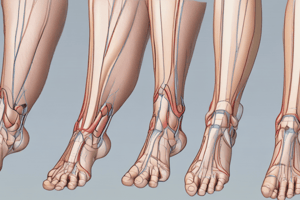Podcast
Questions and Answers
Which of the following is NOT a common difference in the airway of infants compared to adults?
Which of the following is NOT a common difference in the airway of infants compared to adults?
- Large head and short neck predispose to flexion
- The larger tongue can obstruct the airway when unconscious
- The larynx is high in position
- The epiglottis projects anteriorly (correct)
Which type of laryngoscope blade is preferred for infants?
Which type of laryngoscope blade is preferred for infants?
- Miller blade
- Macintosh blade
- Straight blade (correct)
- Curved blade
What is the acceptable percentage of total body water loss in infants?
What is the acceptable percentage of total body water loss in infants?
- 15%
- 5%
- 20%
- 10% (correct)
Which of the following fluid combinations would be considered normotensive for infants?
Which of the following fluid combinations would be considered normotensive for infants?
Which of the following factors increases the risk of hyponatremia and encephalopathy in infants and children?
Which of the following factors increases the risk of hyponatremia and encephalopathy in infants and children?
Which of the following is NOT a reason why infants have poor thermal control?
Which of the following is NOT a reason why infants have poor thermal control?
Which of the following is NOT a recommended measure for maintaining temperature in infants during surgery?
Which of the following is NOT a recommended measure for maintaining temperature in infants during surgery?
What percentage of an adult's surface area is the head?
What percentage of an adult's surface area is the head?
Which of the following is NOT mentioned as a measure for maintaining temperature in infants during surgery?
Which of the following is NOT mentioned as a measure for maintaining temperature in infants during surgery?
When is direct warming needed for infants during surgery?
When is direct warming needed for infants during surgery?
Which of the following is a reason cited for infants having poor thermal control?
Which of the following is a reason cited for infants having poor thermal control?
Flashcards are hidden until you start studying
Study Notes
Pediatric Surgery
- Infants have a larger head and shorter neck, making them prone to flexion.
- The larger tongue can obstruct the airway when the infant is unconscious, making laryngoscopy more difficult.
- The epiglottis projects posteriorly and the larynx is high in infants.
Airway Differences
- Straight bladed laryngoscope is favored in infants due to differences in airways compared to adults.
- Infants are more susceptible to hyponatremia and its subsequent encephalopathy due to their high brain-to-skull ratio.
Perioperative Fluid Management
- Hyponatremia can occur when giving hypotonic maintenance fluid (0.18% saline) or when excess fluid is given.
- Normotensive fluids for infants include 0.18% saline with 4% dextrose or 0.45% saline with 5% dextrose.
Maintaining Temperature
- Infants have poor thermal control due to less subcutaneous fat, greater heat loss from respiration, a higher surface area-to-weight ratio, and immature vasomotor control.
- To maintain temperature, provide a warm environment, insulate the infant's head, warm infusions, use warm and humidified respiratory gases, monitor core temperature, and use direct warming for lengthy operations.
Studying That Suits You
Use AI to generate personalized quizzes and flashcards to suit your learning preferences.




